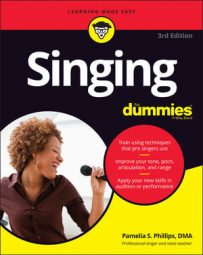Using body energy is really helpful to get a clear speaking or singing sound, especially for belting. Body energy,means that surge of energy in your body that helps you make the sound, such as when you’re about to lift something heavy or when you yell. When you apply this same kind of movement or energy to singing, you can take advantage of that purposeful flow of air to create clear tones on a specific pitch.
You find that your speaking voice can make plenty of noise just because of the breath and energy surging in your body. The surge of energy must come from the center of your body.
As you sing part of your favorite song, rock back and forth from one foot to the other or swing your hips from side to side to feel the surge or connection of energy for your whole body.
You can also bounce in place just to get your legs in motion or engage an imaginary fencing partner.
Using a plié from your ballet class is another way to engage your upper and lower body. Plié means “to bend.” In this case, you bend your knees as you gradually move toward the floor and then back up.
You can also just hold on to something heavy as you sing. Don’t go lifting the pool table, but lift a heavy book as you sing. Notice that, as you lift the book, the tone of your voice responds to the energy moving, which probably makes the tone clear. Keep your breath moving as you experiment with lifting objects.
You want your breath to keep moving. It’s possible to really squeeze and make clear tones, but you know what tension feels like by now and you know that it won’t help you in the long run.
To pump up the volume and make a louder tone, use a faster flow of air and add more energy. To gradually get louder (crescendo) as you speak or sing, speed up the flow of air and exert more energy.
Practice speaking through some dialogue from a song or a monologue; start the tone softly and then gradually get louder to practice this idea of a consistent energy flow. Belting requires a lot of effort; you want your body — not your throat — to make the effort.

